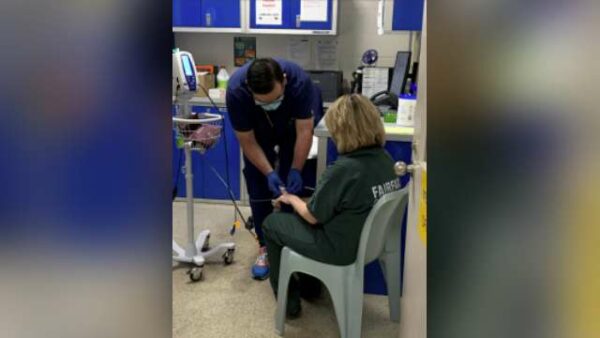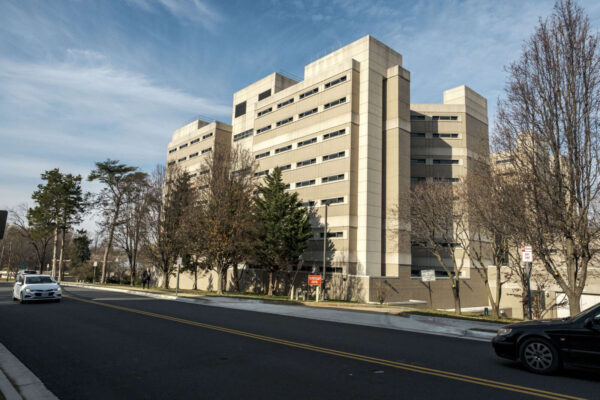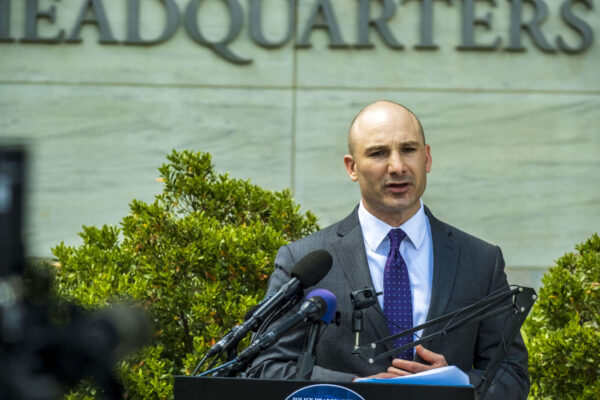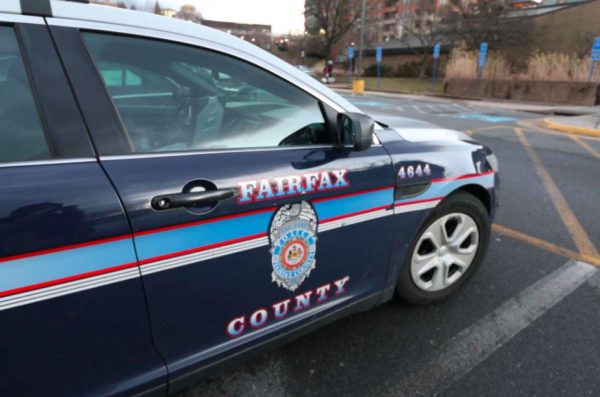
Fairfax County’s Merrifield Center has a new, slightly more descriptive name.
The Sharon Bulova Center for Community Health was officially christened at a dedication ceremony yesterday (Thursday), taking its name from the former Board of Supervisors chairman who helped develop the Diversion First initiative aimed at shifting people with mental health and substance use challenges to treatment instead of incarceration.
“Sharon is more than a mentor, she is a friend, and her legacy to Fairfax County is unmatched,” said current Board of Supervisors Chairman Jeff McKay, Bulova’s successor. “It is entirely fitting that this center, which is at the heart of our Diversion First initiative, is named in her honor.”
Located at 8221 Willow Oaks Corporate Drive, the facility opened in March 2015 to serve as a central hub for the Fairfax-Falls Church Community Services Board, which provides emergency services and other supports for people who have mental illnesses, substance use disorders, and developmental disabilities.
As the board chairman from 2010 to 2020, Bulova oversaw Diversion First’s launch in 2016 as an effort to rethink the county’s approach to mental health after a police officer shot and killed Springfield resident John Geer in 2013 and sheriff’s deputies restrained and stunned Natasha McKenna, resulting in her death in 2015.
“It was their tragic deaths that sparked change,” Bulova said, acknowledging that it was a “pretty tense” time in the county. “Both incidents shown a stark light on the county’s need for reforms and policies regarding transparency, oversight, use of force, and criminal incident response, including and especially in cases involving persons suffering from mental illnesses.”
Focused on people involved in the criminal justice system for non-violent offenses, the initiative started primarily as a partnership between the CSB, police, and sheriff’s office. It has since expanded to include housing assistance and specialty veteran, mental health, and drug court dockets to address the specific needs of those populations.
Per a news release from McKay’s office:
Diversion First is designed to prevent repeat encounters with the criminal justice system, improve public safety, promote a healthier community and is a more cost effective and efficient use of public funding.
Since its founding in 2016, there have been more than 12,000 law enforcement transports to the now-Bulova Center where the Diversion First program is located. Over 8,600 people were under an emergency custody order and 3,540 additional transports were because an officer recognized that an individual in the community needed behavioral health services. Over 2,600 have been diverted from potential arrest. Of those transported to the MCRC by law enforcement, on average 80% do not have a repeat visit to the MCRC related to criminal justice involvement within a year. Over 80% of those diverted from potential arrest in 2019 were not incarcerated during the following year.
“Diversion First is a revolutionary concept that was and remains ahead of its time,” McKay said. “This remarkable facility and its community impact on a daily basis are a testament to the type of change that forward-thinking, innovative local government involvement can make.”
Fairfax County’s approach to criminal justice is quite different from when public defender Bryan Kennedy started his job here a decade ago.
In 2010, the county housed 1,207 people in its jail. That population has been nearly halved, down to 667 people in 2020, according to 2020 Census data compiled by The Marshall Project.
Going back further, the county’s inmate population was 3,749 people in 2000. But the changes from 2000-2010 involved the 2001 closure of the Lorton Reformatory, which housed over 2,800 people as of Dec. 31, 1999 and had its inmates moved to other facilities across Virginia and the federal prison system.
More recently, policy and cultural changes have dramatically altered the county’s judicial system, according to Kennedy, who also belongs to the criminal justice reform group Justice Forward Virginia.
“Ten years ago judges sentenced people to jail much more frequently on low level charges (both misdemeanors and felonies), including misdemeanors like possession of marijuana and driving on a suspended license,” Kennedy said in an email. “People were also held pretrial and held on secured bonds (cash bonds) that they could not afford much more frequently.”
After taking office in 2020 as one of three new progressive prosecutors in Northern Virginia, current Commonwealth’s Attorney Steve Descano ended the use of cash bail and stopped prosecuting simple marijuana possession cases prior to the state’s legalization, though future reform efforts could be challenged by Virginia’s incoming Republican administration.
Kennedy told FFXnow that the judicial system is now more receptive to alternatives to incarceration, as judges and prosecutors feel more comfortable not placing people in jail, because those individuals are getting more services outside of jail.
County Adopts Diversion Framework
One possible driving force behind the decline in Fairfax County’s incarcerated population in the last decade is its Diversion First policy, which began in 2016 after Natasha McKenna’s death at the Fairfax County Adult Detention Center in February 2015.
The initiative aims to reduce the incarceration of people with mental health and substance use issues, as well as intellectual and developmental disabilities, by directing those arrested for nonviolent offenses to services instead of jail, which the county says is less costly. Read More
The results of Virginia’s 2021 general election could have significant ramifications for local efforts to seek alternatives to jail and other criminal justice reforms, Fairfax County Commonwealth’s Attorney Steve Descano says.
Descano, a Democrat, addressed expectations that his agenda will clash with that of Republican Attorney General-elect Jason Miyares in an online event on Tuesday (Nov. 16) hosted by the McLean chapter of the American Association of University Women, which seeks to promote equity and education for women and girls.
A day after defeating incumbent Mark Herring, who was seeking a third consecutive term as Virginia’s top legal officer, Miyares told reporters on Nov. 3 that he plans to introduce a bill that would let the state intervene in local cases.
“This legislation was inspired by a child rape case in Fairfax County, where a defendant was charged with repeatedly raping and molesting a 5-year-old child and was eligible for a life sentence,” Miyares said in a statement to FFXnow, pointing to a case involving Oscar R. Zaldivar, 53, who received a 17-year sentence through a plea deal.
Despite objections from the families involved, Descano’s office defended the sentence in statements to media after the September hearing as longer than what 75% of defendants in Virginia face for the same offenses.
Prosecutors typically get discretion to determine when to pursue a case based on whether the available evidence is sufficient and other factors. Descano said Miyares’s proposal would turn the legal system on its head.
“He wants the police to be able to sideline a prosecutor who’s inconvenient for them at anytime,” Descano said, adding that Fairfax County is fortunate to have a professionalized police force.
Miyares countered that he would get guidance from Commonwealth’s Attorneys to advocate for a bill that would “invite” the attorney general to prosecute child rape or violent crime cases “when the local prosecutor refuses to prosecute.”
The clash between Descano and Miyares presages the uphill battle that Fairfax County’s mostly Democratic elected officials will likely face over the next few years in trying to work with the n0w-Republican-led state government.
The county started a veterans court in 2015 to provide support systems for service members faced with charges. It then launched a Diversion First initiative in 2016 that offers rehabilitation over incarceration for certain nonviolent offenses. Since then, the county has also created specialized court dockets focused on the needs of people with drug addiction and mental health issues.
According to Census data compiled by the nonprofit The Marshall Project, Fairfax County’s jail population has declined significantly over the past two decades, from 3,749 people in 2000 to 1,207 people in 2010 and 667 people in 2020.
Elected in 2019 amid a progressive surge in Northern Virginia, Descano has implemented many of his pledged reforms, including eliminating cash bail, not holding suspects on nonviolent charges when they aren’t deemed a danger to the community, and enabling prosecutors to take “community values” into account instead of deferring to judges.
He said on Tuesday that the changes are intended to improve fairness in prosecutions.
The Office of the Commonwealth’s Attorney also has a data director who is working with researchers from American University and other partners to create a public dashboard with information on how it handles different cases.
Descano says the data will allow for analysis of prosecutors’ decisions, which will help avoid problems, such as unfair treatment based on gender or race.
When asked about the data effort by Aroona Borpujari, a statistician who watched the event, Descano replied that his office will release the data when they have enough of a sample size.
“It’s our pledge that we’re going to be transparent,” he said, describing the office as previously being in the Stone Age.
Less than a third of Fairfax County sheriff’s deputies and less than half of Fairfax County Police Department officers have undergone Crisis Intervention Team training, which seeks to help first responders more safely and effectively help people with mental health issues.
Changing how law enforcement handles situations involving mental health issues is the goal of a program that Fairfax County resumed testing earlier this week, pairing CIT-trained officers with mental health specialists to respond to non-criminal 911 calls.
The pilot program is the county’s first step toward fulfilling a state requirement that it have mental health professionals involved in behavioral health crisis responses by July 2023, but it also stems from the ongoing Diversion First initiative aimed at preventing unnecessary arrests and hospitalizations.
FCPD says 46% of its approximately 1,500 officers are currently CIT-trained.
“It is important to acknowledge the county only adopted the current model of CIT in 2016 and is committed to the continual training of department personnel in crisis intervention training,” police said in a statement.
The Fairfax County Sheriff’s Office says 132 of its 439 deputies have received CIT training.
Neighboring counties report more robust adoption rates.
The Loudoun County Sheriff’s Office tells FFXnow that every deputy serving patrol, corrections, or courthouse duties takes the training within their first two years on the force. Since 2016, Arlington County has required that all new officers take the 40-hour course within six months of completing field training.
Differences in training can contribute to discrepancies in how individual officers treat people with mental health or substance use issues. That inconsistency is one challenge facing Diversion First, Fairfax County Chief Public Defender Dawn Butorac told FFXnow in September.
During a public safety committee meeting on Tuesday (Sept. 28), Board of Supervisors Chairman Jeff McKay said the county “is hoping to get many more officers in” CIT training, calling that a baseline qualification for selecting personnel for the co-responder pilot.
Fairfax County adopted the “Memphis Model” of CIT training in 2016 in response to the Ad Hoc Police Practices Commission that the Board of Supervisors formed in 2015 after facing public criticism and a lawsuit over how the county handled a police officer shooting and killing Springfield resident John Geer in 2013.
In a final report released on Oct. 8, 2015, the commission recommended that the FCPD create specially trained crisis intervention teams, provide base-level training for all officers, require CIT training for certain command positions, including in the patrol division, and offer incentives like flexible shift hours to encourage suitable officers to join a CIT.
According to a progress report on the commission’s 202 recommendations, those proposals have all been implemented, but the FCPD did not respond by publication time when asked for details on the incentives it has for officers to get the CIT training.
The FCPD’s CIT-related administrative records and protocols consist of slideshows used for the training and a general order about emotionally disturbed persons, according to a county administrator.
Other kinds of mental health training for county law enforcement include a Mental Health First Aid Day for the sheriff’s office. In addition, the police department’s general order on the use of force states that officers should take into consideration people’s “medical issues, mental health issues, disabilities, or language and/or cultural differences.”
Meanwhile, the Virginia Department of Criminal Justice Services and Department of Behavioral Health and Developmental Services have issued guidance for CIT programs that in fact discourages agencies from giving the training to all patrol personnel “except as necessary to achieve 24/7 coverage.”
“Experience suggests that a successful CIT program will, at a minimum, have 20-25% of the agency’s patrol division, which will likely result in 24/7 CIT officer coverage,” the state guidance says. “The ultimate goal is to have an adequate number of patrol officers trained in order to ensure that CIT-trained officers are available at all times.”
Per the state guidance:
Just as officers for other specialty areas in law enforcement are not equally suited to every job, so it is with CIT officers. CIT is a training that demands officers have certain skills and experience in order to be effective. For example, because CIT asks officers to take a very different approach in dealing with certain situations, it is beneficial to train officers who are extremely comfortable with their basic policing skills and procedures and have been on the road for a significant period of time. Additionally, CIT training is NOT effective as a means of ‘fixing’ an officer who may not have a well developed set of interpersonal skills.
The Fairfax County Sheriff’s Office has 24/7 CIT coverage on every squad and shift, whether deputies are assigned to the Adult Detention Center, courthouse, or civil enforcement, spokesperson Andi Ceisler said.
She noted that all deputies assigned to the Merrifield Crisis Response Center have CIT training.

Fairfax County has provided drug or mental health treatment services to more than 2,100 people who would have otherwise wound up in jail since launching a diversion initiative five years ago, a recent report on the program says.
Released in August, the 2020 annual Diversion First report suggests the county’s efforts to emphasize support services over incarceration for people with mental health and substance use challenges are starting to pay off.
According to the report, Fairfax County’s jail population saw a 28% decrease from 2015 to 2020 in the number of people with behavioral health issues and misdemeanor charges, while the Fairfax-Falls Church Community Services Board’s Merrifield Crisis Response Center received 37% more cases per year between 2016 and 2020.
Since Diversion First launched on Jan. 1, 2016, total calls for service involving mental illness with police response have risen every year, from 3,566 calls in 2016 to 9,989 in 2020. It wasn’t immediately clear whether that means the number of cases has increased or they are receiving more attention.
“Over the past several years, there has been increased attention on people with mental illness, co-occurring substance use disorders and/or developmental disabilities who come into contact with the criminal justice system for low-level offenses,” Diversion First Director Lisa Potter said in a statement. “In addition, training and screening has increased, allowing for greater opportunities for identification, diversion, and referral and engagement in services.”
Fairfax County created the initiative in the wake of Natasha McKenna’s death at the Adult Detention Center in February 2015. Multiple sheriff’s deputies at the jail hit and used a Taser on McKenna, who had been diagnosed with schizophrenia, when attempting to transfer her to another facility.
While prosecutors declined to press charges in McKenna’s death, the county admitted that its jail had “become a warehouse for people with mental illness.”
“Diversion First offers alternatives to incarceration for people with mental illness, co-occurring substance use disorders and/or developmental disabilities, who come into contact with the criminal justice system for low-level offenses,” the initiative’s website says.
Diversion First has expanded from its initial focus on transferring individuals from police custody to the Merrifield Center, which provides behavioral health and substance abuse services, to also encompass housing and judicial components.
Introduced in 2017, the housing aspects of the initiative include money to assist with initial rents and deposits for Oxford House group recovery homes as well as a partnership with the nonprofit New Hope Housing to provide permanent housing.
“The [New Hope Housing] program has been successful in keeping 30 individuals housed while helping to decrease their rate of psychiatric hospitalization and time spent in jail. This program costs considerably less than what it does to house an individual in jail — more than 50% less,” the 2020 report says, adding that 39 people have been served with this outreach throughout the program’s history.
The county has also added specialty dockets to its court system for veterans, mental health, and a drug court.
Fairfax County Chief Public Defender Dawn Butorac says all three dockets have been going well, as the courts are looking to expand the number of accepted individuals. But she notes there’s room for improvement. Read More




